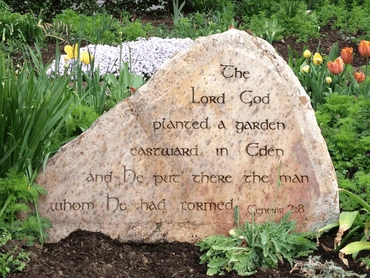Explanation of Genesis 2:17
Av Brian David

There is, for everyone, a crossroads when it comes to spiritual things, a basic decision to be made. Are you going to believe in the Lord and in spiritual reality? Or are you only going to believe what you can see, touch, feel and otherwise "know" from your own mind? The Writings say those who choose the latter course are closing themselves off from the truth, because by definition spiritual reality cannot be seen, touched, felt or otherwise "known" through purely human means. That's what it means to eat "of the tree of the knowledge of good and evil," and it leads to spiritual death – which is being cut off from the goodness and truth the Lord wishes to bestow on us.
The people of the Most Ancient Church were in a state of love to the Lord, and had been invited to gather all the wisdom and knowledge flowing from that love – the fruit of all the other trees. But they had to accept the Lord as the source, had to accept that He existed, had to accept that He was infinite and beyond their finite understanding. To think otherwise – to think that through their own minds they could explain the Lord – would be to put themselves above him, and lead them into evil.
It's worth noting that this was not a call for people to shut down their minds. The fruit of the other trees represents an incredible bounty of exploration, learning and wonderment. And we're not called on to shut down our minds today; the Lord gave us our intellectual faculties for a reason. To let the Lord in, though, we have to accept the unprove-able idea that He is love itself and reality itself, and see all other knowledge in that light.
(Referenser: Arcana Coelestia 126-132, 127, 128-134, 129, 0130)
What the Bible says about... Marriage and Spirituality
Av New Christian Bible Study Staff, John Odhner

People who are truly in love know that marriage is one of the greatest blessings the Lord has given people. But, these days, there's a lot of confusion and doubt about marriage.
Let's take a look at what the Bible says about it, beginning at the very beginning. The very fact that the Lord has created us male and female (Genesis 1:27) seems to indicate that marriage is the intended condition for people.
In the Adam and Eve story, the Lord says, "It is not good that the man should be alone." (Genesis 2:18). Therefore, He creates Eve. It's a very ancient story that depicts marriage as part of His plan for people.
God's blessing on the first marriage makes this even more clear: "And God blessed them and said to them, 'Be fruitful and multiply.'" (Genesis 1:28)
Not only does marriage have the Lord's blessing - it is also phrased as a commandment in this passage from the prophet Jeremiah: "Thus says the Lord of Hosts, the God of Israel.... Take wives and beget sons and daughters, and take wives for your sons and give your daughters to husbands, so that they may bear sons and daughters--that you may be increased there, and not diminished.'" (Jeremiah 29:6)
King Solomon said, "He who finds a wife finds a good thing, and obtains favor from the Lord." (Proverbs 18:22)
In the Gospel of Matthew, Jesus has a telling response to the Pharisees who are quizzing him about divorce:
Jesus answered, "Have you not read that from the beginning the Creator 'made them male and female', and said, 'For this reason a man will leave his father and mother and be united to his wife, and the two will become one flesh. So they are no longer two, but one flesh. Therefore what God has joined together, let man not separate'." (Matthew 19:4-6)
In the text of the Bible, there are also frequent references to a marriage between the Lord and His Church, where the church is made up of the people who love the Lord and follow his commandments. This is a different sort of marriage than the one between husband and wife, but some of the same ideals of love and reciprocity and conjunction are presented.
"As the bridegroom rejoices over the bride, so shall your God rejoice over you." (Isaiah 62:5)
"Your Maker is your husband: The Lord of Hosts is His name." (Isaiah 54:5)
"'Turn, O backsliding children,' says the Lord, 'for I am married to you.'" (Jeremiah 3:14)
"Let us be glad and rejoice, and give glory to Him, for the marriage of the Lamb has come, and His wife has made herself ready." (Revelation 19:7).
See also Jeremiah 31:32; Isaiah 49:18, 61:10; Jeremiah 2:32; Hosea 2:2, 2:19; Ezekiel 16; Matthew 22:2-9; 25:1-10; Luke 5:34; Revelation 21:2, 9; 22:17, etc.
From all this, it's pretty clear that there's strong support in the Bible for marriage.
That said, there are also some passages that have led people in other directions. In some of Paul's letters, there are some things which can be taken to mean that marriage is less chaste than celibacy. And, in answering a question from the Saduccees, Jesus says that in heaven, they neither marry nor are given in marriage. What did he mean by that? It has a deeper meaning than appears on the surface, but it's often been misinterpreted. We will dig into these issues in separate topics, or in an extension to this one... but, overall, the Bible's pretty clear that marriage is part of the Lord's design for us, and that our physical, earthly marriages represent a spiritual marriage, too.






